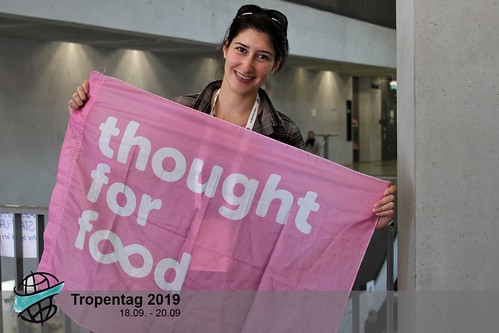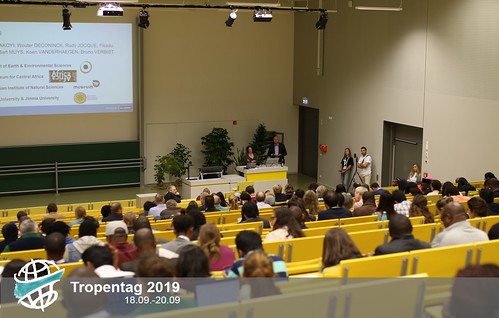Martinelli's blog
Empowering the next generation of food security innovators
Sat, 09/21/2019 - 09:48 — Martinelli
“This is the most connected generation of our entire history”, said Bianca Costa, an inspiring Brazilian student I met (from many others!) today at Tropentag. In a fun interview in Portuguese, she explained that this is the reason why Though for Food believes young entrepreneurs will change the world, or rather, the food production world.

As an ambassador of this NGO, Bianca came to Tropentag to tell young innovators that their ideas have value. More precisely, $10,000. Thought for Food awards young entrepreneurs working for food security, not only in Germany but all over the world. Interested? So be prepared: the TFF Challenge opens on October 16th. The best ideas will receive access to digital labs, mentoring programs and network opportunities, besides the final prize: $2500, $5000 and $10,000 to kick off their projects.

As an ambassador of this NGO, Bianca came to Tropentag to tell young innovators that their ideas have value. More precisely, $10,000. Thought for Food awards young entrepreneurs working for food security, not only in Germany but all over the world. Interested? So be prepared: the TFF Challenge opens on October 16th. The best ideas will receive access to digital labs, mentoring programs and network opportunities, besides the final prize: $2500, $5000 and $10,000 to kick off their projects.
Certified coffee, good for the planet?
Sat, 09/21/2019 - 09:35 — Martinelli
You crave coffee, go to the market and must choose between two options: fairtrade organic versus non-certified coffee. The first option costs few cents more, but as the conscious consumer you are, you decide to choose the first one. You go home happy with your coffee and satisfied for your positive impact in the world. Right?
Not so fast, consumer. Research findings from the Division of Bioeconomics at KU Leuven showed that Voluntary Sustainability Standards (VSS) for food production, such as Fairtrade and Rainforest Alliance, might not deliver all the benefits they promise. By looking at economic and ecological indicators in two coffee producer countries, Ethiopia and Uganda, they discovered that VSS do bring positive effects but, for each benefit they bring, a drawback is generated: the famous trade-offs!

Not so fast, consumer. Research findings from the Division of Bioeconomics at KU Leuven showed that Voluntary Sustainability Standards (VSS) for food production, such as Fairtrade and Rainforest Alliance, might not deliver all the benefits they promise. By looking at economic and ecological indicators in two coffee producer countries, Ethiopia and Uganda, they discovered that VSS do bring positive effects but, for each benefit they bring, a drawback is generated: the famous trade-offs!

“I’m sorry for your loss. May I check your pig?”
Fri, 09/20/2019 - 09:06 — Martinelli
Does it sound cruel? If you said yes, researchers from Friedrich-Loeffler Institute agree with you. They had to go back to after-ebola-outbreak regions to perform a sorology research and here is what they went through.

All of us remember of the 2014-2016 ebola outbreak in West Africa. It was the largest in history leaving more than 10 thousand deaths behind. Although people are not in such high risk anymore, livestock animals such pigs and sheep might still be vulnerable to the disease and threaten local food security. That is why scientists funded by the German Federal Ministry of Food and Agriculture (BMEL) decided to go back to those most affected areas in past and collect animal samples. How would you feel however if a stranger asks to check your animals out after losing a beloved one from the same disease?

All of us remember of the 2014-2016 ebola outbreak in West Africa. It was the largest in history leaving more than 10 thousand deaths behind. Although people are not in such high risk anymore, livestock animals such pigs and sheep might still be vulnerable to the disease and threaten local food security. That is why scientists funded by the German Federal Ministry of Food and Agriculture (BMEL) decided to go back to those most affected areas in past and collect animal samples. How would you feel however if a stranger asks to check your animals out after losing a beloved one from the same disease?
The importance of local population on transforming environments
Thu, 09/19/2019 - 15:48 — Martinelli
The GIZ’s project in Ethiopia, which began in 2008, shows that engaging local population on transformative actions for environment is more important than implementing techniques alone.

Why don’t some people living in Ethiopia’s rural area have strong livelihoods? Boris Büchler, a researcher funded by GIZ, has a strong suspicion: land degradation. After performing “bigger picture” research, taking into account environment, economic and political dimensions, the main finding that Boris Büchler’s suspicion was correct: land degradation is the main problem weakening rural livelihoods.
As any agriculture specialist would agree, the next steps were to implement techniques to reduce and revert this process, such as rehabilitation of degraded land, controlled and zero grazing and integrated soil fertility management. However, what it was not in science books is that another solution could bring unexpected positive results: the promotion of the local watershed user associations.

Why don’t some people living in Ethiopia’s rural area have strong livelihoods? Boris Büchler, a researcher funded by GIZ, has a strong suspicion: land degradation. After performing “bigger picture” research, taking into account environment, economic and political dimensions, the main finding that Boris Büchler’s suspicion was correct: land degradation is the main problem weakening rural livelihoods.
As any agriculture specialist would agree, the next steps were to implement techniques to reduce and revert this process, such as rehabilitation of degraded land, controlled and zero grazing and integrated soil fertility management. However, what it was not in science books is that another solution could bring unexpected positive results: the promotion of the local watershed user associations.
Plant trees, change minds
Wed, 09/18/2019 - 18:18 — Martinelli
You may have heard about rainmakers before, the ones whose influence can bring progress or success. Well, this story is about a forest maker: Tony Rinaudo. Like rainmakers, Tony has a magic touch, in his case to spread native trees in dry lands and bringing countless benefits to the local population. His work on Niger was so impressive that he was awarded the Alternative Nobel Prize in 2018.


Make science, not war
Wed, 09/18/2019 - 11:46 — Martinelli
What do a mining company in Peru, a forest in Ecuador and a river in India have in common? All of them have been stages for conflicts caused by unsustainable practices. The impact caused by those practices in nature affects the ones who most need it: the people who historically live there.
On an attempt to understand this global and complex topic, scientists from different areas got together in Kassel yesterday afternoon, kicking off the Conference Tropentag 2019. Organized by the Center for Development Research (ZEF) at University of Bonn, the workshop called attention to a potential (and surprising) solution: ask the locals! Listening and integrating their knowledge allows easier understanding of where the conflict is happening, its intensity and action taken when they scale up.

On an attempt to understand this global and complex topic, scientists from different areas got together in Kassel yesterday afternoon, kicking off the Conference Tropentag 2019. Organized by the Center for Development Research (ZEF) at University of Bonn, the workshop called attention to a potential (and surprising) solution: ask the locals! Listening and integrating their knowledge allows easier understanding of where the conflict is happening, its intensity and action taken when they scale up.

The secret for producing meat is microscopic
Mon, 09/16/2019 - 18:47 — Martinelli
Meet Sam Oladokun, the young scientist from Nigeria who is changing the way we produce animal protein.

Animal production has been pointed out as the great villain for the environment. If on one hand, reducing meat consumption would decrease GHG emissions, on the other hand changing food habits and dealing with lack of protein are still a challenge.
In the climate change and food insecurity context, finding a way to produce sustainable meat seems to be a better transitional option. The increasing demand, especially from the European market, proves that this can be a way for the future. That is why Sam, as an animal science researcher, is looking for more natural and sustainable ways to produce protein, more specifically from chicken.
If an animal is treated with antibiotics for a prolonged time period, it will get create antibiotic resistance and the required doses of antibiotic will be higher every time. However, if they are treated with "good microbes" (probiotics) the use of antibiotics will decrease, and the products will be a more natural and healthy protein to consume.
And how has he discovered this?

Animal production has been pointed out as the great villain for the environment. If on one hand, reducing meat consumption would decrease GHG emissions, on the other hand changing food habits and dealing with lack of protein are still a challenge.
In the climate change and food insecurity context, finding a way to produce sustainable meat seems to be a better transitional option. The increasing demand, especially from the European market, proves that this can be a way for the future. That is why Sam, as an animal science researcher, is looking for more natural and sustainable ways to produce protein, more specifically from chicken.
If an animal is treated with antibiotics for a prolonged time period, it will get create antibiotic resistance and the required doses of antibiotic will be higher every time. However, if they are treated with "good microbes" (probiotics) the use of antibiotics will decrease, and the products will be a more natural and healthy protein to consume.
And how has he discovered this?




